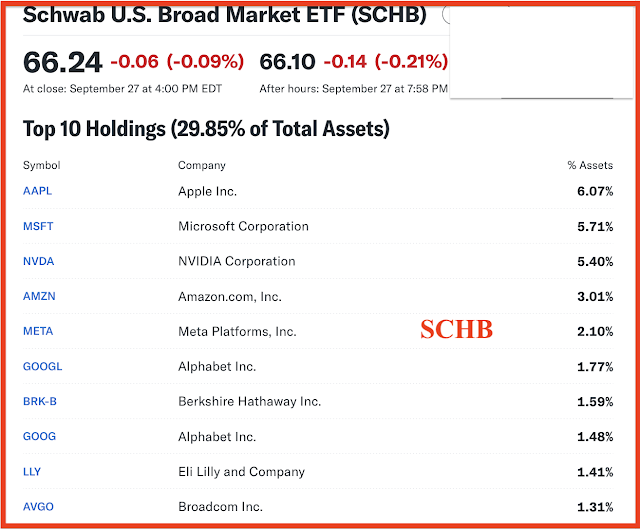Locator: 48431PERSINV.
If I have one regret with regard to personal investing: not pivoting to ETFs sooner.
Schwab ETFs: list here.
Would you rather?
Did your individual stock picks return > 43% this past year?
One needs to know what the ETFs hold.
SCHD -- just dividends.
Compare with SCHD with SCHB:
Compare SCHB with SCHG:
Top ten holdings for each of SCHG and SCHB:
AAPL was one of four top Dow losers this past year (the top four: INTC, NKE, AAPL, BA). AAPL was a top holding in SCHG and yet SCHG had a 43% return this past year.
Of course, this begs another question.
**********************************
Disclaimer
Brief
Reminder
- NOTE: content
and typographical errors may increase due to a number of factors. I
correct them when I find them. But if something seems wrong or doesn't
make sense, it's likely to be a typographical error as anything else.
(Updated: September 28, 2024).
- I am inappropriately exuberant about the US economy and the US market.
- I am also inappropriately exuberant about all things Apple.
- See disclaimer. This is not an investment site.
- Disclaimer: this is not an investment site. Do not make any investment, financial, job, career, travel, or relationship decisions based on what you read here or think you may have read here. All my posts are done quickly: there will be content and typographical errors. If anything on any of my posts is important to you, go to the source. If/when I find typographical / content errors, I will correct them.
- Reminder: I am inappropriately exuberant about the US economy and the US market.
- I am also inappropriately exuberant about all things Apple.
- And now, Nvidia, also. I am also inappropriately exuberant about all things Nvidia.
*********************
The Book Page
Notes for this book will be posted here.
From The Greco-Persian Wars, Peter Green, c. 1996, pp 16 - 17. This took place in 600 years before the birth of Christ, in Athens, Greece. Does this sound familiar?
Cleisthenes had returned from exile under the Spartan military umbrella: to get back into power by constitutional means, once that umbrella had been removed, was a far trickier business.
The conservative group, led by Isagoras, son of Teisander, fought hard -- and with considerable initial success -- to prevent an Alcmaeonid take-over.
They began their campaign by scrutinizing the electoral roll, and getting a good many of Cleisthenes' "new immigrants" supporters disenfranchised on technical quibbles. But they were soon saw that it would pay off better, in the long run, to capture the popular vote rather than antagonize it.
A law was passed abolishing the judicial use of torture against Athenian citizens; other similar measures followed; for two years Isagoras had things very much his own way. The electorate showed no sign whatsoever, at this stage, of welcoming Cleisthenes as a great democratic reformer, for the very good reason that no such idea had yet entered his head.
In 508 BC, however, Isagoras was elected Chief Archon.
Cleisthenes had already held this office, and was thereby debarred from standing again. Something had to be done: as a desperate measure Cleisthenes, to borrow Herodotus's ambiguous phrase, "took the people into partnership."
This probably meant a radical extension of the franchise: to put it bluntly, Cleisthenes bribed the citizen-body to support him by offering them their first real stake in the government, a government that he intended to lead by means of their block (bloc?) vote. The proposal was rushed through the Assembly; and so, by a somewhat singular accouchement (childbirth), Athenian democracy finally struggled to birth.
The child (early democracy in Greece) proved noisy, healthy and troublesome almost before it (democracy) could walk; which was lucky, since other its chances of survival would have been slim.
More on this book later, I suppose.














